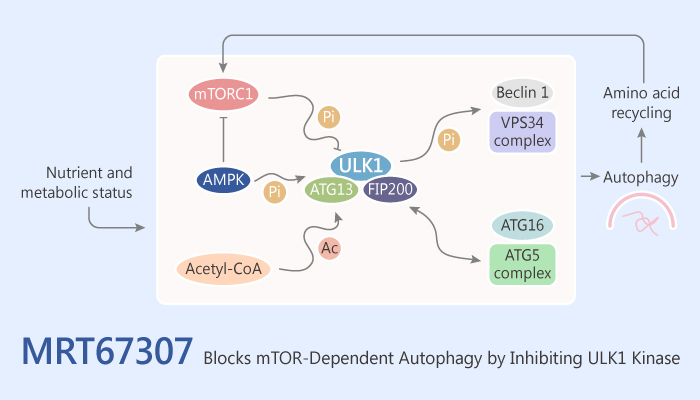Yesterday, I introduced a dual IKKε/TBK1 inhibitor MRT67307. Studies have showed that MRT67307 plays a significant role in innate immunology. Not only this, a study from Katy J. Petherick drew a conclusion that MRT67307 blocked mTOR-dependent autophagy by inhibiting ULK1 kinase.

ULK1, is believed to be specific for autophagy. The authors set out to identify compounds that could inhibit ULK1 activity, not only to act as tool reagents to aid research but importantly to provide a proof-of-principle that targeting ULK1 could block autophagy.
During the research, in vitro, MRT67307 inhibits ULK1 and ULK2, with IC50 values of 45 nM and 38 nM, respectively. Additionally, the authors treated MEFs with MRT67307, in combination with amino acid withdrawal, to inhibit mTOR and activate ULK1. As a result, MRT67307 with the concentration of 10 μM was sufficient to reduce phospho-ATG13 to control levels, and in line with the in vitro IC50 values. Likewise, MRT67307 revealed that it is a relatively specific kinase inhibitor, targeting TBK1/IKKε but also hitting the AMPK-related kinases.
In summary, the authors have shown that MRT67307, potently inhibit ULK1 and ULK2 in vitro and ULK1 in cells. Importantly, this was sufficient to block autophagic flux. Although it might be expected that pharmacologically inhibiting ULK1 would block autophagy, this has not been previously shown and highlights the importance of ULK kinase activity in autophagy induction. It also acts as a proof-of-principle in developing small molecule inhibitors to block autophagy for therapy in diseases such as cancer. Of course, future work will hopefully identify the targets of ULK1 that enable the phagophore to autophagosome switch.